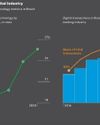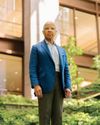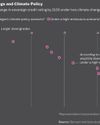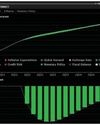
Angela Merkel’s slow-motion departure from the German political stage took an ironic turn in April as the chancellor tripped over a climate law she herself had drawn up. In a shock decision, judges on the country’s highest court ruled that Merkel’s faltering attempts to rewire the energy system away from fossil fuels would saddle future generations with the burden of cutting emissions. Merkel—once hailed as a climate leader, now denounced as a straggler—was ordered to speed things up.
Merkel’s cautious approach threatened the fundamental rights of young people “to a human future,” the judges said, ruling in favor of plaintiff Sophie Backsen, a 22-year-old farmer whose island home of Pellworm off Germany’s North Sea coast might disappear because of rising sea levels. Shaken by the decision, Merkel spent the following weekend in quiet contemplation while she pondered a response.
The court ruling goes straight to the heart of Merkel’s handling of the Energiewende, Germany’s multibillion-euro transition to a low-carbon future. Across her 16 years in power, Merkel the scientist—a true believer in fighting climate change—has been forced to give way to Merkel the politician. Even as she oversaw a boom in renewable energy and positioned her country as a world leader on the environment, she made substantial concessions to the coal lobby, to protesters against new wind farms, and to manufacturing, particularly carmakers.
While Merkel is lauded overseas, her stop-and-start approach has seen Germany’s city centers fill with weekly marches by school-age climate demonstrators. After unprecedented flooding hit parts of the country this summer, she inspected the devastation and witnessed the frustration among victims. “We stand by your side, and we will put everything in order, step by step,” she said.
Denne historien er fra August - September 2021-utgaven av Bloomberg Markets.
Start din 7-dagers gratis prøveperiode på Magzter GOLD for å få tilgang til tusenvis av utvalgte premiumhistorier og 9000+ magasiner og aviser.
Allerede abonnent ? Logg på
Denne historien er fra August - September 2021-utgaven av Bloomberg Markets.
Start din 7-dagers gratis prøveperiode på Magzter GOLD for å få tilgang til tusenvis av utvalgte premiumhistorier og 9000+ magasiner og aviser.
Allerede abonnent? Logg på

See Which Countries Are Falling Behind On Climate Change
Under the Paris Agreement, 190 countries and the European Union pledged to take steps to hold the global temperature rise to less than 2C (3.6F) from preindustrial levels—and preferably 1.5C.

Billionaires Vie for the Future of Brazilian Finance
An escalating battle between two billionaires is upending the financial community in São Paulo, Latin America’s wealthiest city.

Ford Foundation's Darren Walker: ‘We Have to Get Uncomfortable'
DARREN WALKER, 62, disrupted his Wall Street life more than 25 years ago when he left what is now UBS Group AG to volunteer at a school and eventually pursue a career in community development and philanthropy. Since 2013 he’s been at the pinnacle of the philanthropic world as president of the Ford Foundation, created by the family of automaker Henry Ford during the Great Depression to advance human welfare.

Fueling the Ener Transition
I MAY BE BIASED, but some of the most important research and data on the Bloomberg terminal lies in one of its lesser-known functions: {BNEF }

Dig Into Analysts' Estimates for Disruptive Companies
THE PANDEMIC ERA generated a whole wave of disruptive companies as it accelerated the introduction of new products and services in areas including artificial intelligence, digitization, electronic payments, online meeting platforms, and virtual currencies.

Climate Risks Come for Sovereign Credit
FOR YEARS climate scientists have warned about the ferocious wildfires and hurricanes that are now overwhelming many communities. Today alarms are ringing about a related financial danger: risks lurking within government bonds, the biggest part of the global debt market.

Responsible-Investing Pioneer Lydenberg Says ESG Needs An Upgrade
STEVE LYDENBERG’S passion for social change was inspired by anti-Vietnam War demonstrations, consumer boycotts, and the movement to divest from apartheid South Africa. But he didn’t take to the streets. Instead, Lydenberg turned to the world of finance to help catalyze societal change.

Engine No. 1's Grancio: ‘People Will Appreciate an Economic Argument'
ENGINE NO. 1 sent shock waves across corporate America in May when the fledgling investment firm won a boardroom battle with Exxon Mobil Corp., securing three seats on the oil and gas giant’s board after purchasing only about $40 million of its stock.

Find Out Which Companies May Ramp Up Payouts After Covid
AS THE PANDEMIC DISRUPTED business last year, many companies cut or suspended dividends. Which will boost their payouts when economies pick up again?

Get Into the Minds of Central Bankers as They Navigate Shocks
HAVE YOU EVER WONDERED how central bankers forecast the impact of shocks on the economy?